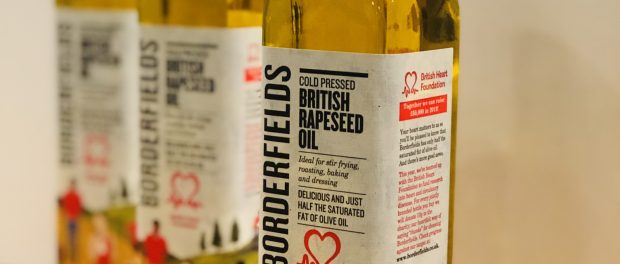Borderfields Pledges to Raise Thousands for British Heart Foundation

Cold-pressed rapeseed oil manufacturer Borderfields has partnered with the British Heart Foundation for 2019 and is set to raise more than £50,000 for the charity.
The Nottinghamshire-based producer launches their jointly-branded bottle with the British Heart Foundation (BHF) to be sold across supermarkets in England and Scotland from February. To celebrate the partnership and raise vital funds for the BHF , Borderfields are donating 10p from every co-branded bottle to the charity.
Director at Borderfields, Paul Davenport, said: “Here at Borderfields, we are always looking to spread the message that rapeseed is a healthy option when it comes to cooking with oil. After all, cold-pressed rapeseed oil contains half the saturated fat of olive oil and can be used to complement a heart-healthy diet.
“Our partnering with the British Heart Foundation is something we are very proud of, they are a charity that does fantastic work and we too will be working hard to secure our target of £50,000 which will help fund the charity’s life saving research. We feel the co-branded, colourful packaging will stand out on the shelves and promote the health benefits of cold pressed rapeseed oil.”
Simon Gillespie, Chief Executive at the BHF, said, “Heart and circulatory diseases kills around 150,000 people each year in the UK – that’s one person every three minutes. We urgently need to fund more research to help end this heartbreak and save lives. So we’re absolutely delighted to have been chosen as Borderfields’ charity partner.
“We’re excited to see the co-branded bottles of Borderfields oil on supermarket shelves. It’s thanks to the support of companies like Borderfields that we can fund life saving research to help the seven million people in the UK living with heart and circulatory diseases.”
Victoria Taylor, Nutrition Lead at the BHF, said: “Switching from saturated fats, like butter and coconut oil, to unsaturated fats, like rapeseed oil, can have a beneficial effect on cholesterol levels, helping to lower the non-HDL, or ‘bad’, cholesterol that is linked to an increased risk of heart and circulatory diseases.”


Leave a comment